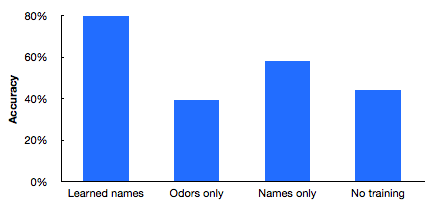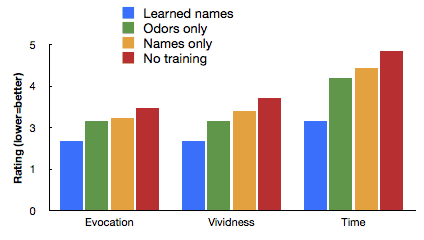Scents, Names, Recall, and Imagination

A few weeks ago Dave Munger at Cognitive Daily had a great post about how naming a smell can help us imagine it in the future. He described research that looked into why it’s fairly difficult for us to identify and imagine scents:
Richard Stevenson, Trevor Case, and Mehmet Mahmut took a look at the history of research into aromas and found that in nearly every case, people have had great difficulty identifying and imagining them. If I ask you to visualize a physical object that you have seen before: a car, a giraffe, and so on, you would probably have little difficulty. But if I ask you to imagine a smell, even one you have recently experienced… you would find it much harder to do. [From Naming scents can help you imagine them (and better appreciate wine?)]
The researchers found that those individuals who had been exposed to both the scent and its name were able to later identify the scent with higher accuracy than those who had been exposed only to the scent or only to its name, or who had received no training at all. (See the first chart.) This is perhaps unsurprising.
More interesting is that those individuals trained with both the scent and its name were better able to imagine the scent than any other group, as shown below (note that a shorter bar is better):

The interplay between scent and memory is quite fascinating. While this research focuses on how names can improve scent recall, it works the other way, too… as I explored in The Brut Effect (subtitled “Cologne Doesn’t Really Make You Smarter”), students who studied material while exposed to a particular scent performed better on tests when that scent was present. Apparently, their memory of what they learned was improved solely by the presence of the scent that accompanied their exposure to the material.
The neuromarketing message for marketers is simple – there is a complex and not-always-obvious interaction between our memory, our olfactory sense, and both names and other learned information. Incorporating scent as a branding aid or as a means to evoke particular kinds of memories is likely to improve results if done in a consistent and logical way. And, as the research described above shows, associating a name with the scent will help consumers recall it and even imagine it.
Related:
Smell Better, Sell More
A Whiff of Our Smelly Future
Does Your Marketing Smell?
